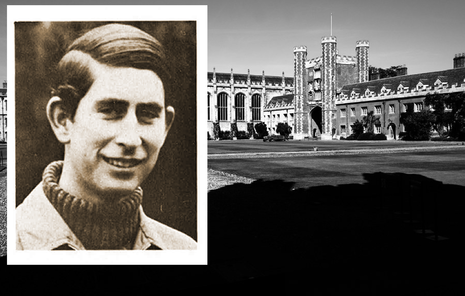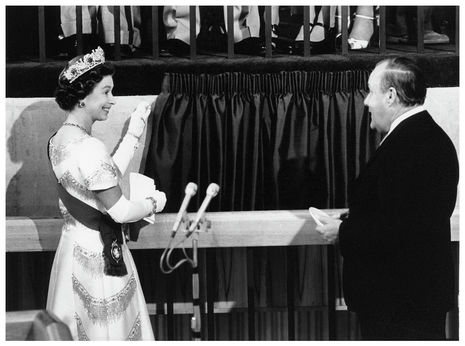Oxford can stuff their 16 prime ministers – Cambridge has a king
Charles III has absorbed Cambridge’s emphasis on tradition instead of Oxford’s obsession with power

Should you be familiar with a meeting of the University Labour Club, I invite you to imagine the scene. Comrades, sitting around a table at one of our good locals, workingman’s pint in hand, deep into discussion of Theory and Praxis and other such wonders, fall into an awkward silence. A majestic young figure, his regal bearing unaffected by his noble nose, capacious ears, and fulsome fingers, has joined the table. Do they stand? Do they simply nod? Is it Your Royal Highness, or Comrade Charles Philip Arthur George? Or Comrade Wales?
As fanciful as it sounds, it very nearly did occur. Our now King, while at Cambridge in the 1960s, was only steered away from such dangerous moral quandaries by the wise hand of R.A. Butler, then Master of Trinity.
One can imagine the Queen’s relief – though the Prince of Wales almost joining a political association seems a far less worrying issue than Edward VII’s behaviour when he came to Trinity. Famously, Edward VII was not the biggest exponent of “education” or “learning things”, unless what he was learning involved merry-making and behaviour unfitting of a British prince at Cambridge. Our now-King, however, is a man who topped tripos every year, before graduating with a class yours truly has the great honour of sharing: a 2:ii.
And so, a Cantab has acceded to the highest office in the land. In many ways, he is an atypical Cantab, but perhaps more than we’d expect, he embodies the ways in which Cambridge makes leaders differently.
Oxford, in their conceit, like to boast about their many storied alumni (they should remember that it is often those with the least to boast who boast the most). Sixteen Prime Ministers, all that nonsense. I am proud to say that Peterhouse’s last prime minister was the Duke of Grafton, some time in the late 18th Century. Downing Street is not a noble residence. Consider all that Oxford has contributed to the world: fast running (useless, no one needs to do a mile in four minutes), some ineffectual prime ministers (both incompetent and almost certainly morally compromised), the googly (a form of lying), John Locke (a liar). I venture to say the entire university has, over the course of a thousand years, been a complete waste of time.
But does it matter that we have a Cantabrigian King? No doubt, with the royal will behind us, we can ban tourists from blocking the path to my door, ban people comparing our dinners to Hogwarts, make the U Bus run to Girton, teleport the railway station closer to the centre, and make hall food rise to gourmet quality, furnished with the love and care of Duchy Originals products. Pray for it, manifest it, whatever takes your fancy. With a Cantab King, the opportunities are endless.
But, even if he doesn’t quite deliver that, our King might still reveal something about the way our two institutions form students. An Oxonian in No. 10, and a Cantabrigian in the Palace our King shouldn’t shock us. Politicians are, in the immortal word of Sartre, those whose hands have been plunged in the merde et sang. Of all things, these are what Oxford is known for. Here, we are known for scientists, medical breakthroughs, comedians of variable quality. And Kings.
There is a stark contrast between Kwasi Kwarteng and Liz Truss’s ultra-libertarian Brittania Unchained and Charles’s magnum opus, Harmony. Instead of growth at all costs, Charles looks to a future where we care for each other and for our heritage. Perhaps our University, with far more Historians and Classicists than Politico-Philosopho-Economists, might be better suited to producing leaders with respect for the past, rather than for the grift and self-promotion of parliament. We make, instead, those whose hands shall be anointed, and whose head shall wear a crown. Whose values are constancy, faith and service.
So remember, next time an Oxonian gloats about that Sixteen Prime Minister nonsense, that politicians are fickle things, who come and go like showers in Spring. But kings and queens are made of stronger stuff, anointed with oil and made holy: and educated at Cambridge.
 Features / Beyond the porters’ lodge: is life better outside college?24 February 2026
Features / Beyond the porters’ lodge: is life better outside college?24 February 2026 News / Cambridge academics sign open letter criticising research funding changes22 February 2026
News / Cambridge academics sign open letter criticising research funding changes22 February 2026 Theatre / Footlights Spring Revue? Don’t Mind if I Do!25 February 2026
Theatre / Footlights Spring Revue? Don’t Mind if I Do!25 February 2026 Fashion / The evolution of the academic gown24 February 2026
Fashion / The evolution of the academic gown24 February 2026 News / Student and union protesters hold ‘Trans Liberation Solidarity Rally’ 24 February 2026
News / Student and union protesters hold ‘Trans Liberation Solidarity Rally’ 24 February 2026









![How to Create an Attractive Freelancer Portfolio [5 Tips & Examples]](https://www.varsity.co.uk/images/dyn/ecms/320/180/2026/02/vitaly-gariev-ho2tNOWZYXM-unsplash-scaled.jpg)
